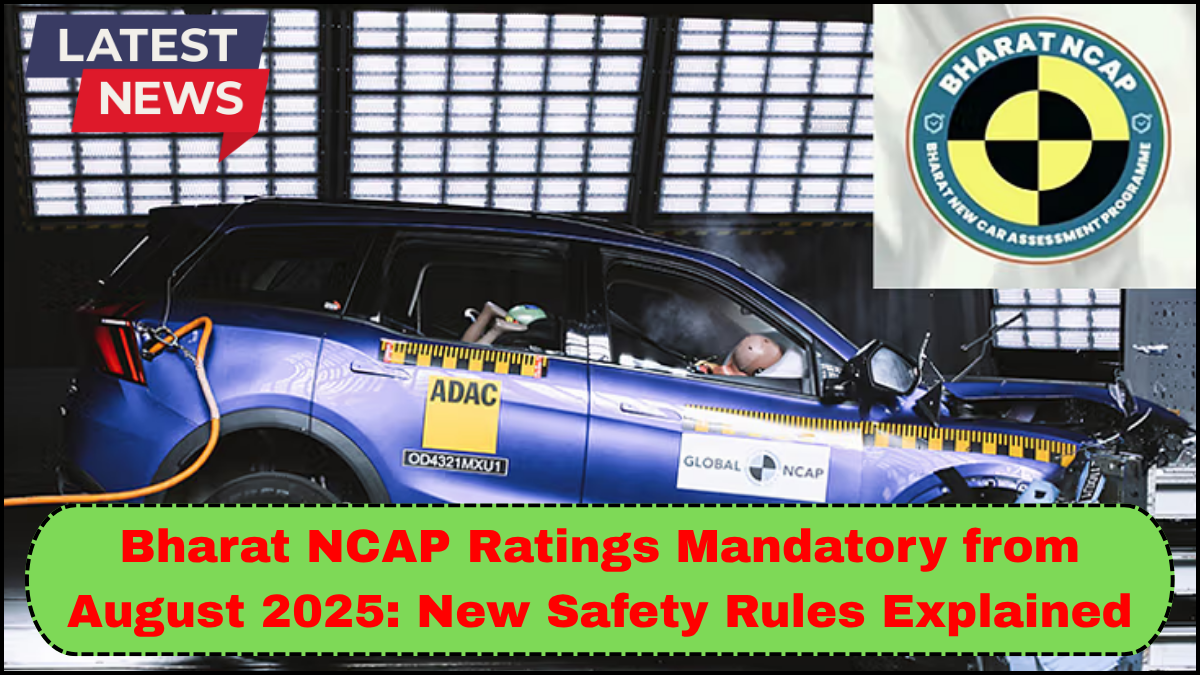India is stepping up its vehicle safety game. Beginning August 2025, the government will make Bharat NCAP (New Car Assessment Program) ratings mandatory for all new car models. This decisive move is part of a broader strategy to enhance road safety and align India’s automotive standards with global benchmarks.

What is Bharat NCAP?
Bharat NCAP is India’s indigenous car safety assessment program, modeled on international frameworks like Euro NCAP and Global NCAP. Under this initiative, vehicles are crash-tested and rated from 1 to 5 stars based on how well they protect occupants in the event of a collision.
The program will evaluate vehicles on multiple criteria:
- Frontal and side crash tests
- Pedestrian protection
- Child occupant safety
- Vehicle structure and integrity
These tests help consumers understand how safe a vehicle truly is, beyond what brochures and marketing materials claim.
Why Are These New Car Safety Rules in India 2025 Important?
India has one of the highest rates of road fatalities globally. As of recent data, over 150,000 lives are lost annually due to road accidents. Many of these tragedies could be avoided with stronger vehicle safety standards.
The new car safety rules India 2025 will:
- Encourage manufacturers to improve safety features
- Empower consumers to make informed purchasing decisions
- Reduce fatalities and serious injuries
- Promote the export potential of Indian-made cars by aligning with international standards
This mandate will especially benefit entry-level cars, which often lag behind in safety equipment and crash resilience.
What Will Change for Car Manufacturers?
Automakers selling cars in India will need to submit new models for Bharat NCAP testing starting August 2025. Compliance won’t be optional anymore.
Here’s what manufacturers will face:
- Mandatory crash testing by certified facilities
- Star ratings displayed on every vehicle, similar to energy efficiency labels on appliances
- Potential redesigns or feature additions to meet minimum safety benchmarks
Companies that ignore or delay compliance risk being barred from launching new models.
How Will This Impact Car Buyers?
For consumers, the Bharat NCAP rating mandatory policy means greater transparency. Buyers will no longer need to rely on vague claims like “high safety standards.” The star rating will be clearly visible, enabling more responsible decision-making.
Additionally, as competition increases around safety ratings, even budget cars may soon come equipped with advanced features like:
- Electronic Stability Control (ESC)
- ISOFIX child seat mounts
- Multiple airbags
- Advanced driver-assistance systems (ADAS)
This makes the market safer across the board, not just at the premium end.
Comparison with Global NCAP
India has participated in Global NCAP’s Safer Cars for India initiative since 2014. While it brought attention to poor safety ratings in some models, participation was voluntary.
With Bharat NCAP, the Indian government takes full ownership. It:
- Establishes a national regulatory framework
- Uses Indian driving conditions as a key reference
- Makes safety compliance non-negotiable
This marks a significant shift from advisory to enforcement.
Challenges and Opportunities
While this policy is a leap forward, it comes with its challenges:
- Cost pressures for small car manufacturers
- Need for investment in testing infrastructure
- Training and upskilling of engineers in safety design
However, the long-term benefits—fewer fatalities, improved brand credibility, and increased global competitiveness—far outweigh these hurdles.
FAQs
Q1: What is the Bharat NCAP rating system?
A: It’s India’s official vehicle safety rating program. Cars are crash-tested and assigned a star rating (1 to 5) based on occupant and pedestrian protection.
Q2: Is Bharat NCAP mandatory for all vehicles?
A: Starting August 2025, it will be mandatory for all new car models launched in India.
Q3: Will car prices go up due to these new safety rules?
A: Possibly, especially for entry-level models, as manufacturers invest in additional safety features. However, increased safety justifies the cost.
Q4: How is Bharat NCAP different from Global NCAP?
A: Bharat NCAP is government-mandated and tailored to Indian conditions, while Global NCAP is a voluntary international program.
Q5: Can consumers use Bharat NCAP ratings when buying a car?
A: Absolutely. The star rating will be displayed prominently, helping buyers choose safer vehicles.
click here to learn more

